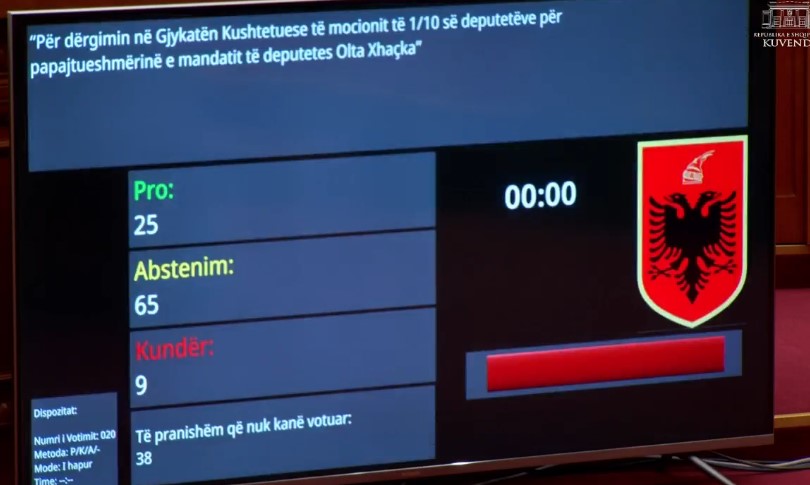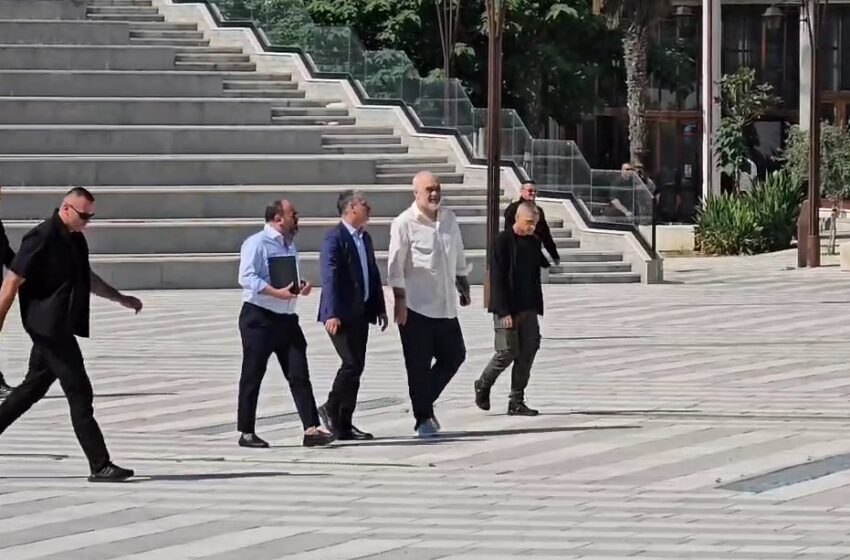Parliament fails to refer case on mandate of Socialist MP to Constitutional Court

Following the abstention of Socialist MPs, Parliament decides not to send the mandate of Socialist MP and former Foreign Minister Olta Xhaçka to the Constitutional Court for review. The vote, held in the early hours of September 13, saw 65 Socialist MPs abstain, 9 vote against the referral, and 25 Democrats vote in favor of sending the case to the Court.
Why is this important
While initially about a Democratic Party request about the removal of Xhaçka’s mandate, whom they accuse of benefiting financially from her husband’s designation as a strategic investor by the Albanian government, the case has evolved into a seemingly insolvable constitutional deadlock about the separation of powers and the role of the judiciary in overseeing parliamentary decisions and dictating how MPs should vote.
Background
In June 2022, the Democratic Party called for the removal of MP Olta Xhaçka’s mandate, claiming that she had benefited from public funds due to her marriage to a businessman who was awarded the status of strategic investor by the Albanian government. Xhaçka, rejected the accusation and pointed out that the resort was being constructed on private land, financed by private funds and the strategic investor classification was granted to her husband’s project in the same way as to many other investments that satisfy a series of objective criteria. Ms. Xhacka claimed that her husband, who is a well-known and successful businessman from the early 1990s, has not gained any public funds from the strategic investor designation, but only the right to have precedence in renting a segment of beach in front of the beachfront development he is investing in from the Municipality of Himara at the same rates as any other investor in Albania.
As per parliamentary procedure, the request was reviewed by the Parliamentary Committee on Mandates and Immunity. Since there was no consensus, in accordance with parliamentary rules the two opposing sides presented separate reports to the plenary session for approval.
On November 17, 2022, the Socialist majority in Parliament approved the report drafted by their representatives, rejecting the Democratic minority’s report. The majority concluded, through voting, that Xhaçka was not in violation of mandate rules, as there was no evidence that her husband’s title as a strategic investor resulted in financial gain from the state budget. The title was deemed an honorary designation that granted investors juridical security but offered no proven economic benefit.
Following the vote, the Democratic Party filed a complaint with the Constitutional Court, seeking to resolve the conflict between Parliament and the judiciary regarding which institution holds the authority to remove an MP’s mandate. In its first decision in January 2023, the Constitutional Court requested that Parliament vote to support the referral of the case to the court for review.
However, in April 2024, the Socialist majority in Parliament refused to vote as ordered by the Court arguing that no court, including the Constitutional Court, can directly order members of Parliament how to vote because in a democratic system, the separation of powers ensures that the legislative body retains the freedom to vote independently.
In the early hours of September 13, during the plenary session, 65 Socialist MPs abstained from the vote, 9 voted against, while 25 Democrats voted in favor of referring the case to the court. As the required majority of more than 50% of MPs present was not achieved, the motion was rejected.
The Socialists now plan to seek guidance from the Venice Commission, requesting an opinion from the experts of the European Commission for Democracy through Law to clarify where the free will of MPs to vote intersects with the mandatory enforcement of Constitutional Court decisions. The Socialists hope to address this unprecedented dilemma and seek clarity on the obligations of lawmakers when such decisions arise.


